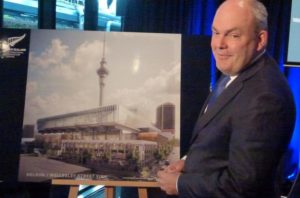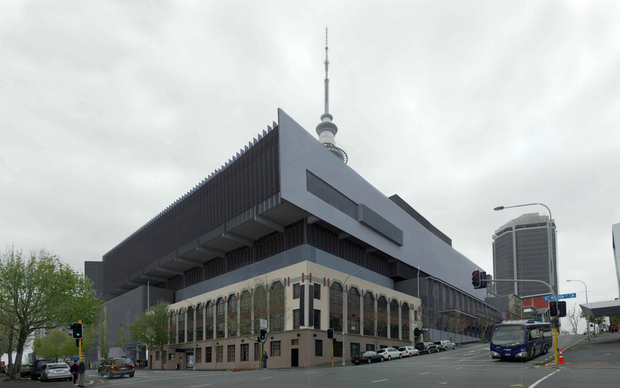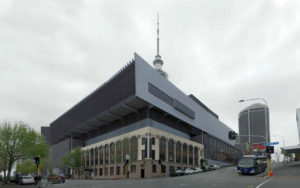
Half of the work on the steel frames for the SkyCity Convention Centre in Auckland has gone to a foreign contractor, despite New Zealand factories having prepared for it.


Half of the work on the steel frames for the SkyCity Convention Centre in Auckland has gone to a foreign contractor, despite New Zealand factories having prepared for it.
With 8500 tonnes of steel frames needed for the SkyCity convention centre, the making and fitting contract has gone to one New Zealand company and a United States-owned company in Thailand.
The loss equates to about 100 full-time skilled welding jobs for 12 to 18 months – and the same thing has happened in two other projects of similar scale.
The government touted job creation as a big plus when it sealed the controversial deal for SkyCity to build the centre in return for large extra gambling concessions.
The government said last night this was the way the free market worked.
The main contractor for the International Convention Centre, Fletcher Construction, told RNZ News it was a win for Whangarei company, Culham Engineering, which had linked up with Thai Herrick.
But at D & H Steel Construction in Auckland, managing director Mike Sullivan is wondering how the work evaporated before his eyes.

“In fact, we had the backing of the whole steel industry behind us to deliver that project for Fletcher’s and made that well known to them,” Mr Sullivan said.
Asked if Fletcher said anything about the New Zealand industry needing to gear up, he responded: “Definitely … definitely, only six months ago we had a forum initiated by Fletcher along those lines”.
Mr Sullivan said he did not know what happened in the intervening six months, and it appeared unusual – he expected to get a debrief from Fletcher Construction soon.
When Prime Minister and Tourism Minister John Key and Economic Development Minister Steven Joyce turned the first sod on the ICC’s construction in February, Mr Joyce said “this important national facility will now bring 1000 new jobs during the construction phase”.
Last night, the Minister, who was travelling in Asia, said in a statement that “any decisions around which building materials are used … will not affect the number of people being employed” to build it.
It was unclear how that could be.
The head of major steel fabricator Grayson Engineering of Auckland, David Moore, had expected the convention centre and other big projects to carry his firm on, after four years of the industry proving its capabilities during the Christchurch rebuild.
“We’ve responded by gearing our organisation up with a second shift,” Mr Moore said.
” … we still are [running that shift], but at the moment we’re running probably only between two-thirds and three-quarters of capacity … but we did nevertheless gear up in anticipation some of this big anchor-type project work.”
Fletcher said the convention centre steel contract meant more than 50 jobs would be created, some in Whangarei, under the joint venture between Culham Engineering and US-owned Thai Herrick.
Thai Herrick and Culham have also just won, from Fletcher Construction, a second big job – for 6500 tonnes of steel for Auckland’s Downtown Precinct, a private project.
Mr Sullivan said D & H Steel had lost out there too despite having a very competitive bid, and he did not know why.
Thai Herrick had the third major project all to itself – 6000 tonnes of steel framing for a public project, the taxpayer-funded Acute Services hospital building in Christchurch.
It was awarded that by Australian-owned CPB Contractors which heads the build, up against local bidders under a government procurement process that is meant to place a priority on achieving the best value for everyone, including the New Zealand economy and local jobs.
David Moore of Grayson Engineering in Auckland discerned a pattern.
“There is a bit of a trend developing,” he said.
“What we’re seeing, even putting those three big projects aside, there’s been smaller work, talking sort of sub-1000 tonne jobs that have had offers from overseas on the table.
“We’ve been fighting really hard to try and procure that work for our own people … they are obviously undercutting our local offering by enough of an amount to make it a worthwhile proposition for the procurement people.”
Minister Steven Joyce said the contractual relationship with Fletcher Construction was independent of government, except that SkyCity must show it was following best practice in procurement – that is, the building arrangements.
Culham engineering’s general Manager Rob Kirwan would not comment, saying his firm had been instructed months ago not to say anything but when pressed he finally said Calhums would be in charge of quality assurance and that “quality will not be an issue”.
A steelmaker in Sydney said Australian firms, like their New Zealand counterparts, were struggling to keep jobs onshore.
Simon Preston, general manager of Sydney sheet steel maker Precision OxyCut, told Morning Report there was a similarly un-level playing-field in Australia.
“An example of this last week, was that we were quoting into a large crane project. The situation was that at 4 o’clock we were given an opportunity to look at this, and at seven-thirty I got an email saying we no longer had the opportunity as they had already been purchased by the Victorian government, using a Chinese supplier.”
Mr Preston said the work would have created up to 500 jobs.